In December 14, 2021, a seminar on capacity building and institutional development of personnel of organizations related to disaster risk reduction (DRR) activities was held in Ashgabat. This seminar brought together about 20 representatives of relevant state and public organizations and summed up a series of thematic seminars. The organizers of the event are the civil society organization “Nature Preserving Society of Turkmenistan” (NPST) and the USAID/Governance Support Program in Turkmenistan (GSP) held a similar seminar in all the velayats (regions) of the country during the second half of the outgoing year. As a result, about 100 national DRR experts improved their knowledge, exchanged ideas, analyzed specific cases of natural and man-made disasters, got acquainted with international experience and applied measures to prevent and eliminate disasters.
Nargiza Metyakubova, a Project management specialist from USAID in Turkmenistan, who attended the seminar, noted in her welcoming speech to the participants that this seminar was the logical conclusion of a series of seminars held this year and another step in increasing the potential of civil servants, strengthening the interaction of state and public organizations on DRR.
The seminar began its work with a speech by Merdan Garayev, deputy head of the department of NPST in the Akhal velayat. He spoke about the work carried out by the department. “This year,” M.Garayev noted, “despite the obvious difficulties caused by the coronavirus infection, the department showed good results compared to the previous year. Several expeditions were carried out to clean up natural monuments located on the territory of the Akhal velayat. As you know, last year, in honor of the celebration of the 25th anniversary of Turkmenistan’s permanent neutrality, the country’s authority decided to plant 25 million trees throughout the country, and this year, in honor of the 30th anniversary of Turkmenistan’s Independence, 30 million trees. And the NPST annually increases the volume of growing seedlings in order to contribute to improving the ecological condition and preventing natural disasters in the country.” These are not simply some phrases, since deciduous trees are the best sinks of the main greenhouse gas CO2, the excess in the atmosphere of which is directly related to global warming. The most vulnerable industry to the effects of climate change is agriculture, as due to droughts, yields are decreasing, the area of degraded cultivated land is increasing, and cases of fires are becoming more frequent.
It was the topic of fires, which is one of the main types of disasters, that was brought up for discussion by Gurbanmammet Silgeldiyev, an employee of the fire safety department of the Akhal velayat.

“Fires in nature mainly occur due to the careless attitude of people with fire and because of their irresponsible actions that cause fires. Many people visiting natural places do not comply with the requirements of fire safety, violating bonfires in fire-hazardous places. Moreover, leave the bonfires unextinguished, throw matches or cigarette butts, glass containers, etc. All this becomes potential sources of forest fires. In rare cases, the cause of forest fires can be natural phenomena, that is, thunderstorms, as well as man-made ones – a short circuit on electrical lines. And our task is not only to respond to emergencies, the culprit of which is a person, but also to carry out preventive measures as a way to prevent an emergency situation,” G.Silgeldiev said. Then the participants were shown an instructive video about fire safety measures in nature.
Jemal Durdykova, a specialist in the field of waste management of the project of the UNDP and the Ministry of Agriculture and Environmental Protection of Turkmenistan “Sustainable Cities in Turkmenistan: Integrated Green Urban Development in Ashgabat and Awaza” spoke about the planned activities within the framework of the “waste sorting and recycling” project. The topic of her presentation also touched upon the handling of radioactive and toxic waste, which by extreme danger can be attributed to man-made disasters. Examples of other countries were given in order to assess the consequences and extent of damage from such a category of disasters.
Participants demonstrated an great interest while listening to the speech of Timur Aliyev, a representative of the Tebigi Kuwwat enterprise of NPST, who spoke in detail about the various climate risks inherent in Turkmenistan. This includes droughts, dust storms, water scarcity and other climatic factors. T.Aliyev noted that the fight against these phenomena is one of the biggest priorities within the framework of achieving the Sustainable Development Goals. Residents of Central Asian countries feel the effects of drought, and sand and dust storms (SDS) in different ways.
“The drought in some regions of the country began at the end of 2020, and by March it had covered most of the country. The Akhal, Mary and, to some extent, Lebap velayat suffered particularly severely from it. For the first time in the entire history of weather observations, such a small amount of precipitation fell in Ashgabat from January to September 2021 – about 36 mm. This is even less compare to the climatic benchmark of March alone. In some regions, rains were completely absent for 5-6 months,” the expert added. Recall that after the NPST joined the Global Network of Civil Society Organizations for Disaster Reduction (GNDR), Tebigi Kuwwat, Yenme and the Mert climbing club became members of the GNDR.
The negative impact of drought and SDS, as well as mitigating their consequences, is the most important task which can be tackled only through close cooperation between the Central Asian countries. In Turkmenistan, in order to ensure a sustainable supply of water resources and improve the country’s biodiversity, a grandiose Turkmen lake “Altyn Asyr” has been created, which has become the largest hydraulic engineering structure. And the biology teacher of secondary school No. 14 of the “Ak Bugdai” etrap of the Akhal velayat Mashad Mashadov in his report spoke in detail about the influence of the Turkmen lake “Altyn Asyr” on the flora and fauna of the Kurukuma desert, as well as about its role in preventing the occurrence of disasters.
Batyr Allagulyev, an employee of the Civil Defense and Rescue Operations Directorate in the Akhal velayat of the Ministry of Defense of Turkmenistan, told the seminar participants about the work of the Directorate at the present time, including the development of the working telephone-alarm line, the notification system and the development of the official website, as well as other innovations aimed at improving coordination of actions during emergencies among the civilian population.
Further, the chairman of the climbing club “Agama” Valeriy Kotvin told about the work of the club. He noted that 20% of the territory of Turkmenistan is occupied by mountains, which are the object of industry, tourism, sports and recreation of people. At the same time, natural disasters occur in mountainous areas: rockfall, landslide, mudslide, and in the mountains there are cases of people getting injured. The climbing club “Agama” has repeatedly provided professional assistance in the process of rescue operations to victims in the mountains, trained rangers of the Koytendag reserve, since most of the area of natural reserve is made up of mountains. V.M. Kotvin, as during other meetings, expressed readiness and desire to continue to provide any assistance that minimizes the danger of people staying in the mountains.
It would be wrong to say that only rescue and environmental structures can be involved in DRR activities. Surely, in emergency situations, the role of organizations providing social services to the population is great. More importantly, in addition to providing physical assistance to the victims, the provision of psychological assistance is crucial as well. Gulya Choreklieva, the head of the “Yenme” CSO, in her speech, drew attention to the fact that elder people and people with disabilities are, especially, the ones seeking for assistance in emergency situations, as they may experience difficulties in moving and providing themselves with the necessary assistance. An important part of G.Choreklieva’s presentation was the information campaign on DRR for children with disabilities. It is known that children perceive visualized information with examples better, taking this into account, the trainers of “Yenme” CSO regularly hold contests, events in a playful form with drawings, and other activities for them.
It is especially gratifying to observe the well-established interaction of state and public organizations in this direction. The interest in cooperation once again proves the need for joint solutions to the issues of safe and high-quality life of citizens of our country. Only together can the desired results be achieved. It should be noted that as a result of all 5 thematic seminars in all velayats, the first Information Guide on vulnerable territories of Turkmenistan to natural disasters will be developed and handed over to all interested organizations.







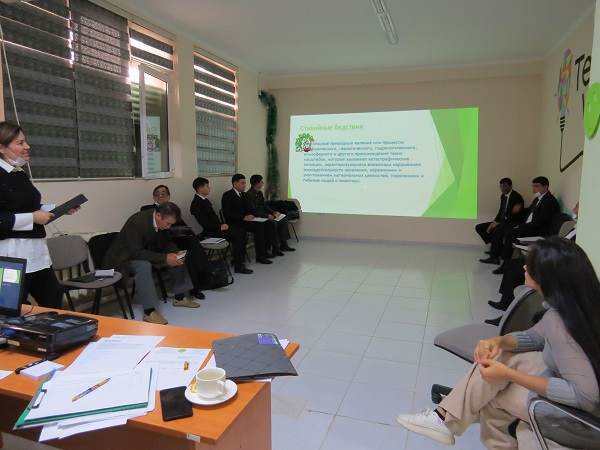
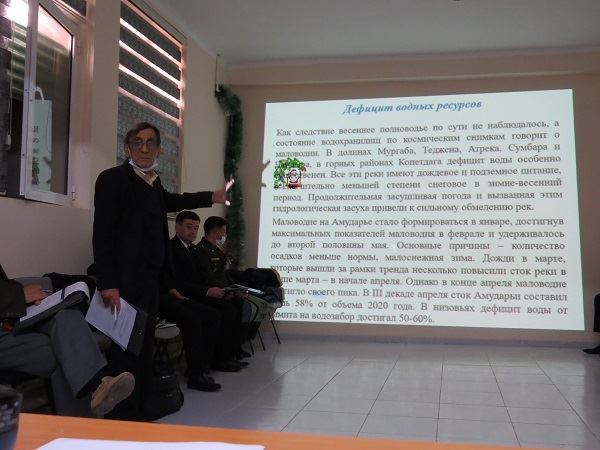
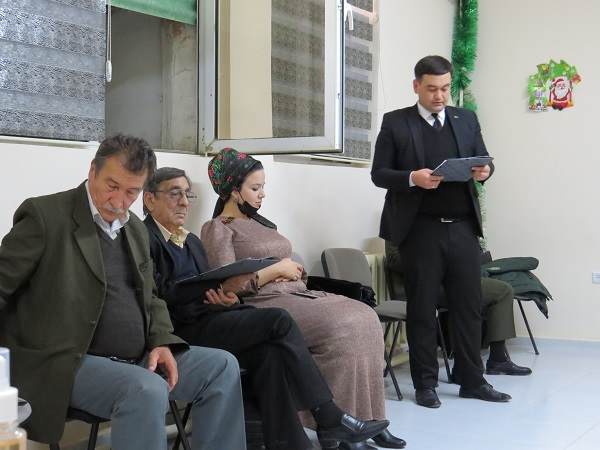
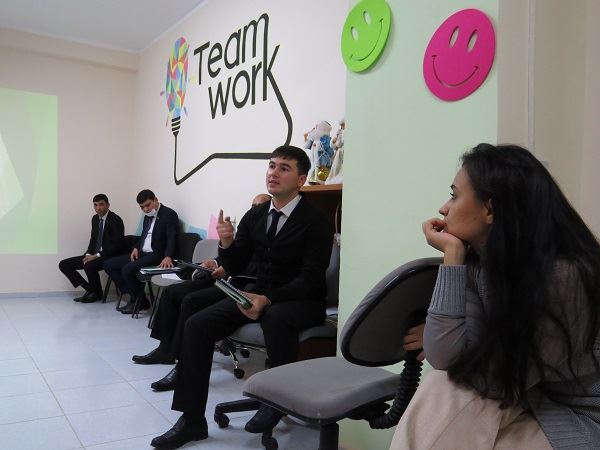
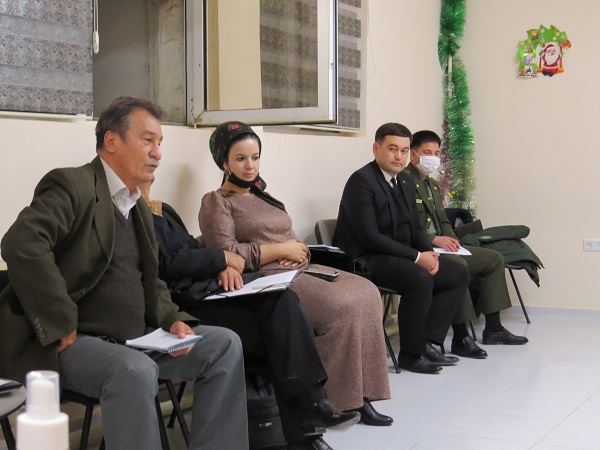
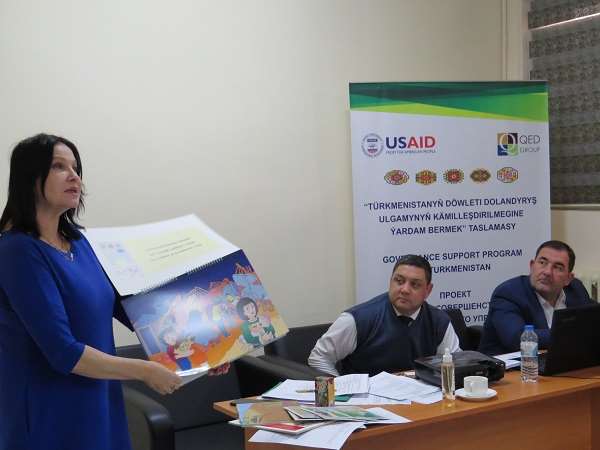
Comments